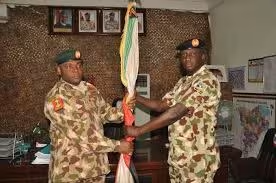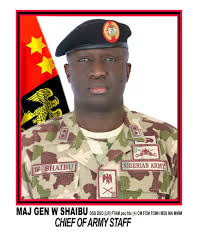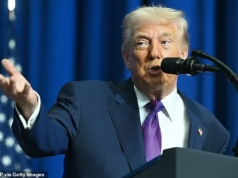
Coup Fears or Counter-Insurgency Shake-Up? Inside the Controversial Appointment of New COAS, Maj. Gen. Waidi Shaibu
The Controversial Context: A Mass Sacking Amid Coup Rumours
President Bola Tinubu’s decisive dismissal of the nation’s top military brass on Friday, October 24, 2025, was highly unusual, paving the way for the appointment of Major General Waidi Shaibu as the new Chief of Army Staff (COAS).
The appointment is instantly controversial not due to the officer’s profile, but due to the timing of the mass firing.

The Unsettling Precedent: The sackings came amid heightened speculation of a “coup scare” that had recently swept through Abuja. Although the Presidency and Defence Headquarters officially dismissed the rumours as routine, analysts argue the abrupt overhaul serves as a firm, symbolic declaration of the Commander-in-Chief’s authority and a swift move to recalibrate command structures to ensure loyalty.
The Mandate of Urgency: The shake-up signals that the new leadership—including Maj. Gen. Shaibu—is taking over with a non-negotiable mandate to deliver immediate, measurable results on security, particularly in the volatile Northeast and Northwest regions. The President’s action has placed the new COAS under intense pressure to justify the sudden transition with decisive victories on the battlefield.
Maj. Gen. Waidi Shaibu: The Brains and Brawn of the Armour Corps
The new COAS, Maj. Gen. Waidi Shaibu, is widely regarded as an exceptional appointment, bringing a rare blend of intellectual depth and frontline combat experience to the highest office of the Nigerian Army.
History and Military Pedigree
Origin: Born on December 18, 1971, in Olamaboro LGA, Kogi State.
Corps: Commissioned into the Armour Corps in 1994, after joining the Nigerian Defence Academy (NDA) as part of the 41st Regular Course in 1989.
Key Command Experience: Before his elevation, he served as the powerful Theatre Commander of the Joint Task Force, Operation Hadin Kai (OPHK), where he was responsible for leading counterinsurgency efforts against Boko Haram and ISWAP in the Northeast. His tenure was marked by significant operational successes, including deep clearance operations into Sambisa Forest and the recovery of large caches of weapons.
Operational Footprint: His battle experience spans over three decades, including participation in major domestic operations (like Lafiya Dole and Tura Takaibango) and international peacekeeping missions in Liberia and Sudan.
The Intellectual Edge
Shaibu’s academic credentials stand out, suggesting a strategic approach to tackling Nigeria’s complex, hybrid security challenges:
Degrees: Holds a Bachelor’s in Mechanical Engineering (NDA) and multiple Master’s degrees, including:
Master’s in Public Administration (University of Calabar)
Master’s in Strategic Studies (University of Ibadan)
Master’s in Security and Strategic Studies (National Defence University, Washington D.C.)
Elite Training: He is an alumnus of the renowned Harvard Kennedy School of Government and is currently pursuing a PhD in Strategic Studies at the University of Ibadan.

The Controversial Challenge: Translating Intellect to Victory
The central debate surrounding Shaibu’s tenure will be whether his impressive academic and strategic background can successfully overcome the deep, structural challenges facing the Army:
Tactical vs. Strategic Success: As a successful Theatre Commander, he excelled at the tactical level. The COAS role, however, demands high-level strategic restructuring, resource management, and complex political manoeuvring—challenges even the most decorated officers often struggle with.
The Morale Crisis: The new COAS must address potential low morale and internal discontent within the ranks, which the recent coup rumours hinted at. Reaffirming professionalism and prioritizing troop welfare will be critical to sustaining the counter-insurgency tempo.
Political Interference: Shaibu must navigate the political expectations tied to his sudden appointment while maintaining the apolitical integrity of the Nigerian Army. His success will be measured by security gains, not political allegiance.

He takes on the mantle of the COAS with a clear reputation for composure, discipline, and strategic insight, yet the shadow of the politically charged sackings of his predecessors ensures his every move will be scrutinized for its impact on Nigeria’s volatile security landscape.
Join Our Social Media Channels:
WhatsApp: NaijaEyes
Facebook: NaijaEyes
Twitter: NaijaEyes
Instagram: NaijaEyes
TikTok: NaijaEyes




